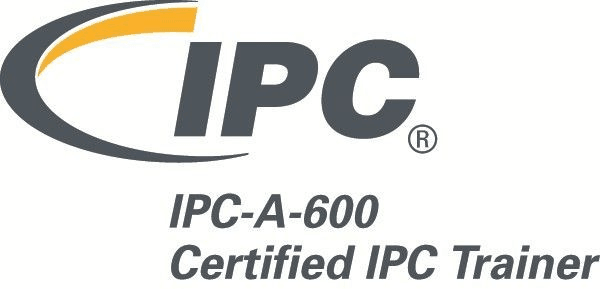Nearly everything electronic in the universe depends on the printed circuit board (PCB). For many years, the IPC-A-600 Acceptability of Printed Boards and IPC-6012 Qualification and Performance Specification for Rigid Printed Boards documents have set the standard for PCB workmanship quality, giving comprehensive acceptance criteria with full color illustrations and photographs showing all types of printed board surface and internal conditions. Because of its importance to both the PCB manufacturer and assembler, the IPC-A-600 has become one of the most widely used documents ever published by IPC.
The IPC-A-600 Training and Certification Program helps all segments of the electronics interconnection industry improve their understanding of printed board quality issues, greatly enhances communication between PCB manufacturers, their suppliers and their customers and provides a valuable portable credential to industry professionals as well as recognition for their companies.
The training is intended for operators, instructors, quality managers, assembly technicians and process engineers with extensive experience in the production and assembly of PCB and electronic circuits.

Those interested in company-wide quality assurance initiatives have an industry developed and approved, IPC-sponsored program to support their commitment to continuous operations and product improvement. IPC recognition sends a strong message to customers that your company is serious about implementing IPC-A-600.

IPC-A-600 Certified Specialist (CIS)
Acceptability of Printed Boards
Certified IPC Training
Training schedule IPC-A-600 CIS
Module 1 to 4 (only theory)
Module 1:
Introduction
Duration: ca 2 hours
- Introduction
- Training & Certification Policies and Procedures
- IPC-A-600H Introduction
- Review and Questions
Module 2:
Externally observable Characteristics
Duration: ca 5 hours
- Printed Board Edges
- Base Material Surface and Subsurface
- Solder Coatings and Holes Printed Contacts and Marking
- Solder Mask, Pattern Definition and Flatness
- Review and Questions
Module 3:
Internally observable Characteristics
Duration: ca 4 hours
- Dielectric Materials and Conductive Patterns
- Plated Through Holes
- Review and Questions
Module 4:
Miscellanous
Duration: ca 3 hours
- Miscellaneous and Cleanliness Testing
Exam:
100 questions, open book, duration: ca 3 hours
Daily training plan:
- 9:00 Start of the training
- 10:30 Coffee break
- 10:45 Continuation of the training
- 12:00 Lunch
- 13:00 Continuation of the training
- 14:30 Coffee break
- 14:40 Continuation of the training
- 17:00 End of the training
The exam day plan:
Last day of the training
- 8:30 Start of the training
- 9:00 Start of the exam
- 10:30 Coffee break
- 10:45 Continuation of the exam
- 12:00 Graduation and evaluation
-
pdfPB Technik formularz zamówienia IPC-A600.pdf
pdf -298.97 KB
-
pdfProgram szkoleniowy IPC-A600.pdf
pdf -180.21 KB
-
pdfRegulamin działu szkoleń 01.06.pdf
pdf -246.08 KB
-
pdfOrder form for IPC-A-600 Training
pdf -1.07 MB
-
pdfIPC-A-600 Schedule
pdf -709.04 KB
IPC-A-600
2025-09-29-2025-10-01
